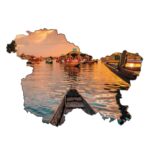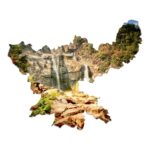Jammu and Kashmir National Conference (JKNC): 7 Key Insights Into Its Role in Shaping the Region’s Politics and Society
The Jammu and Kashmir National Conference (JKNC) is a major political party that has played an essential role in the history and political landscape of Jammu and Kashmir. Founded in 1932 by Sheikh Abdullah, the party has significantly influenced the region’s socio-political structure and its relationship with the Indian Union. This article delves into the history, significance, and impact of the Jammu and Kashmir National Conference on both the state and the broader Indian context.
History of Jammu and Kashmir National Conference (JKNC)
The JKNC was established as a political response to the changing dynamics in Jammu and Kashmir in the 1930s. Initially named the All Jammu and Kashmir Muslim Conference, it was later renamed in 1932 to the Jammu and Kashmir National Conference under the leadership of Sheikh Mohammed Abdullah. The party’s founding vision was to represent the interests of the people of Jammu and Kashmir, with a focus on self-rule and greater autonomy within the Indian Union.
Sheikh Abdullah’s leadership was instrumental in the party’s success, and his charisma helped establish the JKNC as a dominant political force in the region. The party’s central ideology revolves around secularism, democracy, and autonomy for Jammu and Kashmir, while advocating for the integration of the region with India, but with significant local self-governance.
The National Conference played a crucial role in Jammu and Kashmir’s accession to India after independence in 1947. Under Sheikh Abdullah, the JKNC was the key political entity that signed the Instrument of Accession with India, leading to the integration of Jammu and Kashmir into the Indian Union. Since then, the party has been a significant player in the political developments of the region, providing leadership in both the state government and national politics.
Daily Life Impact of Jammu and Kashmir National Conference (JKNC)
The Jammu and Kashmir National Conference has had a profound effect on the daily lives of the people of Jammu and Kashmir. As a dominant political party, it has shaped policies and programs that directly impact the region’s development, social welfare, and governance.
Under the JKNC’s leadership, several initiatives were undertaken to improve the quality of life for the people, especially in the post-independence era. One of the major achievements was the land reforms carried out in the 1950s, which redistributed land from wealthy landowners to the landless peasants, providing a significant boost to agriculture in the region. These land reforms were essential in curbing feudalism and ensuring that the economic benefits of the region’s resources were more equitably distributed.
The party has also prioritized education, healthcare, and infrastructure development, with a focus on improving the lives of people in both urban and rural areas. Over the years, the National Conference has played a role in shaping the region’s economy by promoting initiatives that encourage industrial growth and tourism, especially in areas like Srinagar, Gulmarg, and Pahalgam.
However, the ongoing political instability in Jammu and Kashmir has meant that the people have also faced periods of hardship and uncertainty. Despite this, the Jammu and Kashmir National Conference has consistently positioned itself as a party that is concerned with the welfare of the common people, advocating for greater autonomy and political stability.
Key Facts About the Jammu and Kashmir National Conference
- Foundation: The Jammu and Kashmir National Conference was founded in 1932 by Sheikh Abdullah.
- Role in Independence: The JKNC played a critical role in Jammu and Kashmir’s accession to India in 1947.
- Land Reforms: The party implemented significant land reforms in the 1950s, promoting social and economic justice.
- Secular Ideology: The JKNC has consistently promoted secularism and regional autonomy while advocating for greater integration with India.
- Political Leadership: The party has produced several prominent political leaders, including Sheikh Abdullah, Farooq Abdullah, and Omar Abdullah.
- Jammu and Kashmir Autonomy: The party has been a strong advocate for Article 370 and special provisions for the state, while also promoting local governance.
- Social Welfare: The JKNC has emphasized education, healthcare, and economic growth, aiming to uplift the lives of the region’s people.
Significance of Jammu and Kashmir National Conference (JKNC)
The JKNC has played a critical role in shaping the political, economic, and social landscape of Jammu and Kashmir. The party’s emphasis on autonomy has made it a central figure in debates surrounding Jammu and Kashmir’s status within India, especially regarding Article 370 of the Indian Constitution, which grants the state special status. The JKNC’s advocacy for autonomy and its historical stance on Kashmir’s integration with India have influenced national discourse for decades.
One of the key points of significance is the party’s role in the land reforms of the 1950s. These reforms were revolutionary for the region, as they aimed to eliminate the feudal system that had long dominated Jammu and Kashmir. By redistributing land to the landless, the National Conference contributed to the creation of a more just and equitable society.
The Jammu and Kashmir National Conference has also played a significant role in maintaining the region’s secular fabric, promoting coexistence among the diverse religious communities in the state, including Hindus, Muslims, and Sikhs. The party’s secular outlook has contributed to its popularity in the region, as it positions itself as a party that transcends religious lines and prioritizes the welfare of all citizens.
Observance and Wishing the Jammu and Kashmir National Conference
The Jammu and Kashmir National Conference celebrates several significant occasions throughout the year, particularly those tied to the region’s political history and achievements. The most notable observance is the birth anniversary of Sheikh Abdullah, which is celebrated with great reverence by party members and supporters. This day is marked with gatherings, speeches, and tributes to his contributions to the region’s development and political integration with India.
Wishing the Jammu and Kashmir National Conference on these occasions is a way to honor its historical role in the region and its continued presence in the political landscape of Jammu and Kashmir. The party’s legacy of fighting for the rights of the people and advocating for a peaceful, prosperous future remains a point of pride for many in the region.
FAQs About the Jammu and Kashmir National Conference (JKNC)
- Who founded the Jammu and Kashmir National Conference? The Jammu and Kashmir National Conference was founded by Sheikh Abdullah in 1932.
- What role did JKNC play in the integration of Jammu and Kashmir with India? The JKNC played a pivotal role in ensuring Jammu and Kashmir’s accession to India after independence in 1947.
- What are the main principles of JKNC? The Jammu and Kashmir National Conference has focused on secularism, democracy, regional autonomy, and integration with India.
- Who are some of the prominent leaders of the JKNC? Prominent leaders include Sheikh Abdullah, Farooq Abdullah, and Omar Abdullah.
- How has JKNC impacted the daily life of people in Jammu and Kashmir? The party has contributed to land reforms, economic growth, social welfare, and education, which have had a significant impact on the lives of the people of Jammu and Kashmir.
Conclusion
The Jammu and Kashmir National Conference (JKNC) has played an undeniable role in shaping the political, social, and economic landscape of the region. Its contributions to Jammu and Kashmir’s integration with India, its emphasis on secularism, and its historic land reforms have left a lasting imprint on the region. Despite the challenges and political complexities the party has faced, its significance in the history of Jammu and Kashmir remains unparalleled. As the party continues to navigate the changing political environment, its legacy and ongoing influence will likely shape the future of the region.










